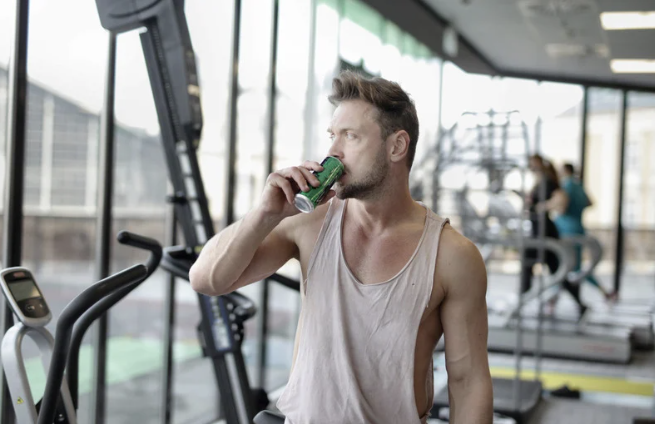
Pre-workouts have become a staple in the fitness industry, promising to boost energy, improve performance, and enhance focus.
But how young is too young to start using these supplements when it comes to age?
Let's dive in and find out.
The safest age to start taking pre-workout supplements is generally considered to be around 18 years old.
However, even at this age, it's important to avoid pre-workouts with high stimulant content, artificial sweeteners, coloring, and unsafe ingredients.

Pre-workouts are dietary supplements designed to help you get the most out of your workouts.
They typically contain a mix of ingredients like caffeine, amino acids, and other performance-enhancing substances.
But they're more than just an energy boost - they can also help improve endurance, increase strength, and speed up recovery.
The key to understanding pre-workouts lies in their ingredients.
Common components like caffeine, beta-alanine, and creatine each play a unique role in enhancing workout performance.
For instance, caffeine stimulates the nervous system, helping you feel more alert and focused.
On the other hand, beta-alanine can delay muscle fatigue, allowing for longer, more intense workouts.
The question of age is crucial when it comes to pre-workouts.
While there's no universally agreed-upon age, most experts suggest it's safe for individuals over 18 to consume pre-workouts.
This is primarily due to the high caffeine content found in many pre-workout supplements, which can adversely affect younger individuals.
While beneficial for boosting energy and focus, caffeine can be a double-edged sword.
It's particularly concerning for younger individuals who may not be accustomed to its effects.
High caffeine intake can increase heart rate, high blood pressure, and sleep disturbances.
Young bodies are still growing and developing, making them more susceptible to the effects of certain substances.
High doses of caffeine and other stimulants found in pre-workouts can potentially interfere with this natural growth and development process.
For teenagers eager to maximize their workouts, it's crucial to understand the potential risks associated with pre-workout supplements.
While some ingredients may be beneficial, the high caffeine content and other stimulants in many pre-workouts may pose risks.
It's always best to consult a healthcare professional before starting any new supplement regimen.
When choosing a pre-workout, looking for products with transparent labeling and clinically backed ingredients is essential.
Avoid products with proprietary blends, as these can make it difficult to know exactly what you're getting.
For a deeper dive into safe pre-workouts, check out these guides on safest pre-workouts and pre-workouts for teens.
While pre-workouts are primarily used for enhancing physical performance, they can also offer benefits outside the gym.
For instance, the mental focus provided by caffeine and other ingredients can be useful for studying or other cognitive tasks.
Research on the long-term health effects of pre-workout supplements is still ongoing.
While some studies suggest potential risks associated with long-term use, more research is needed to draw definitive conclusions.
There are alternatives for young athletes looking for a performance boost without the risks associated with pre-workouts.
Proper nutrition, adequate hydration, and a good night's sleep can all significantly impact workout performance.
The question of when it's safe to start using pre-workout supplements is complex.
While there's no universally agreed-upon age, most experts suggest that individuals over 18 can safely consume pre-workouts.
This is primarily due to the high caffeine content found in many pre-workout supplements, which can adversely affect younger individuals.
Caffeine, a common ingredient in pre-workouts, is a powerful stimulant that can significantly affect the body.
In adults, caffeine can help increase alertness and improve exercise performance.
However, caffeine can increase heart rate, high blood pressure, and sleep disturbances in younger individuals, particularly those unfamiliar with its effects.
Moreover, young bodies are still growing and developing, making them more susceptible to the effects of certain substances.
High doses of caffeine and other stimulants found in pre-workouts can potentially interfere with this natural growth and development process.
For teenage athletes eager to maximize their workouts, it's crucial to understand the potential risks associated with pre-workout supplements.
While some ingredients may be beneficial, the high caffeine content and other stimulants in many pre-workouts may pose risks.
It's always best to consult a healthcare professional before starting any new supplement regimen.

When choosing a pre-workout, looking for products with transparent labeling and clinically backed ingredients is essential.
Avoid products with proprietary blends, as these can make it difficult to know exactly what you're getting.
Also, be wary of products with excessively high caffeine content or other potent stimulants.
These can be particularly risky for younger individuals or those with certain health conditions.
Instead, opt for pre-workouts with proven performance-enhancing ingredients like beta-alanine, creatine, and citrulline malate, without the excessive stimulants.
For a deeper dive into safe pre-workouts, check out these guides on safest pre-workouts and pre-workouts for teens.
In conclusion, while pre-workouts can enhance workout performance, they should be used cautiously, particularly by younger individuals.
Always consult with a healthcare professional before starting any new supplement regimen, and remember that a balanced diet, proper hydration, and adequate sleep are the foundations of good athletic performance.
Despite their benefits, pre-workouts aren't without risks.
Overuse can lead to dependency, and the high caffeine content can cause various side effects.
Using these supplements responsibly and listening to your body's signals is crucial.
While pre-workout supplements can enhance workout performance, they also come with potential downsides that users should be aware of.
Addictive Potential: Like coffee, pre-workout supplements often contain caffeine, which can be addictive.
Over time, users may need to increase their dosage to achieve the same effects, leading to a cycle of dependence.
Artificial Ingredients: Many pre-workouts contain artificial sweeteners and coloring.
While these ingredients may make the product more appealing, they don't provide any performance benefits and may even have negative health effects.
High Stimulant Content: Pre-workouts often contain high levels of stimulants like caffeine.
While these can provide an energy boost, they can also lead to side effects like jitteriness, increased heart rate, and sleep disturbances.
In extreme cases, excessive stimulant intake can lead to more serious health issues like heart arrhythmias.
Unsafe Ingredients: Some pre-workouts contain ingredients that are not well-studied or could potentially be harmful.
It's important to choose products with transparent labeling and clinically backed ingredients.
In conclusion, while pre-workout supplements can provide performance benefits, they also have potential downsides.
Using these products responsibly and consult a healthcare professional before starting any new supplement regimen is essential.
Understanding the pre-workout impact on different age groups is crucial for making informed decisions about supplement use.
Let's look at the considerations for each age group from 13 to 18.
At this age, the body is just beginning to undergo the changes associated with puberty.
Hormonal fluctuations can increase energy and growth spurts, making the body more sensitive to external substances.
Given the high caffeine content and other potent ingredients in pre-workouts, it's generally advised that 13-year-olds avoid these supplements.
Instead, focus on establishing a balanced diet and regular exercise routine.
Is it safe for a 13-year-old to take pre-workouts?
No, it's generally not recommended due to their ongoing growth and development.
While 14-year-olds may be more physically mature than their 13-year-old counterparts, they're still in a critical stage of growth and development.
The potential risks associated with pre-workout supplements, particularly those related to caffeine and other stimulants, remain a concern.
It's recommended that individuals in this age group continue to focus on nutrition and exercise, without the addition of pre-workouts.
Is it safe for a 14-year-old to take pre-workouts?
No, the potential risks associated with pre-workouts still outweigh the potential benefits at this age.
By age 15, many teens have established regular exercise routines and may want to enhance their performance.
While some may consider using pre-workouts at this stage, caution is still advised.
If a 15-year-old is considering a pre-workout, choosing a product with minimal stimulants is crucial.
You can find 100mg caffeine pre-workouts and 150mg caffeine pre-workouts here.
Is it safe for a 15-year-old to take pre-workouts?
It's generally not recommended, but if they choose, they should opt for a low-stimulant product and consult with a healthcare professional.

At 16, some teens may be physically mature enough to start using pre-workout supplements.
However, choosing products with low caffeine content and proven safe ingredients is still important.
Is it safe for a 16-year-old to take pre-workouts?
It may be safe for some 16-year-olds, but they should start with a low dose and choose a product with minimal stimulants.
By age 17, many individuals are nearing physical maturity, and some may choose to incorporate pre-workouts into their fitness routine.
However, caution should still be exercised, particularly with products containing high levels of caffeine or other potent stimulants.
Is it safe for a 17-year-old to take pre-workouts? It may be safe for some 17-year-olds, but they should still exercise caution and consult with a healthcare professional.
At 18, most individuals are considered adults and may have the physical maturity to handle pre-workout supplements.
However, even at this age, it's important to choose products with transparent labeling, clinically backed ingredients, and reasonable levels of stimulants.
Is it safe for an 18-year-old to take pre-workouts?
Yes, most 18-year-olds can safely use pre-workouts, but they should still exercise caution and consult with a healthcare professional.
While pre-workouts can enhance workout performance, they should be used cautiously, particularly by younger individuals.
Always consult with a healthcare professional before starting any new supplement regimen, and remember that a balanced diet, proper hydration, and adequate sleep are the foundations of good athletic performance.
Pre-workout supplements blend various ingredients, each with a specific role in enhancing your workout performance.
Let's break down some of the most common ingredients found in these supplements and understand their effects.
Caffeine is a staple ingredient in most pre-workout supplements and for a good reason.
It's a powerful stimulant that affects the central nervous system, leading to increased alertness and reduced fatigue.
This means you can push harder and longer during your workouts.
However, it's important to note that caffeine affects everyone differently.
Some people may experience jitters, increased heart rate, or difficulty sleeping after consuming caffeine, especially in high doses.
Beta-alanine is an amino acid that helps produce carnosine, a compound that plays a key role in muscle endurance during high-intensity exercise.
By increasing carnosine levels in your muscles, beta-alanine helps delay muscle fatigue, allowing you to squeeze out those extra reps or push through that final sprint.
While beta-alanine is generally safe, it can cause a tingling sensation in the skin, known as paresthesia.
This side effect is harmless and usually subsides on its own.
Creatine is one of the most well-researched and effective supplements for improving strength and power output during resistance training.
It works by increasing your muscles' phosphocreatine stores, which produce ATP, the primary energy currency of cells.
This leads to improved performance during short, intense bursts of exercise, like lifting weights or sprinting.
It's worth noting that while creatine is beneficial for most people, it may not have the same effects on everyone.
Some people are "non-responders," meaning they don't see any performance benefits from taking creatine.
Citrulline malate combines the amino acid citrulline and malate, a compound involved in energy production.
This ingredient is often included in pre-workout supplements to increase nitric oxide production, leading to better blood flow and a greater "pump" during workouts.
In addition to the pump, citrulline malate may help improve endurance and reduce muscle soreness, making it a valuable addition to any pre-workout formula.
You can find the best pump supplements here.
Branched-chain amino acids (BCAAs) are a group of three essential amino acids: leucine, isoleucine, and valine.
They're called "branched-chain" due to their chemical structure resembling a tree branch.
BCAAs are crucial for muscle protein synthesis, which is building new proteins in your muscles.
By stimulating this process, BCAAs can help promote muscle growth and recovery.
They may also help reduce muscle damage and soreness after intense workouts.
These are just a few ingredients commonly found in pre-workout supplements.
Each ingredient serves a specific purpose, and together, they work to help you get the most out of your workouts.
However, it's important to remember that everyone's body responds differently to these ingredients, so what works best for one person may not work well for another.
Always listen to your body and adjust your supplement regimen as needed.

Can a 13-year-old take pre-workout supplements?
No, it's generally not recommended for a 13-year-old to take pre-workout supplements due to the high caffeine content and other potent ingredients that could interfere with their ongoing growth and development.
Are pre-workout supplements safe for a 16-year-old?
It may be safe for some 16-year-olds to take pre-workout supplements, but they should start with a low dose and choose a product with minimal stimulants. It's always best to consult with a healthcare professional before starting any new supplement regimen.
What are some natural alternatives to pre-workout supplements for teens?
Natural alternatives to pre-workout supplements for teens include a balanced diet, adequate sleep, staying hydrated, and regular exercise. A cup of coffee can also provide a natural energy boost.
Can a balanced diet replace the need for pre-workout supplements?
A balanced diet is the cornerstone of any fitness regimen and can provide the energy and nutrients your body needs to perform at its best. While pre-workout supplements can enhance workout performance, they're not a replacement for a healthy diet.
How does sleep affect workout performance?
Sleep is when your body recovers and rebuilds from your workouts. Getting enough sleep can improve your performance, mood, and overall health. Lack of sleep can lead to fatigue, decreased performance, and increased risk of injury.
Is coffee a good pre-workout for teens?
Coffee can be a good natural pre-workout for teens as it's a natural source of caffeine, which can increase alertness and improve exercise performance. However, it should be consumed in moderation due to potential side effects like jitteriness or trouble sleeping.
How much water should I drink for optimal workout performance?
Staying hydrated is crucial for optimal physical performance. It's recommended to drink at least 8 cups (64 ounces) of water per day, but you may need more if you're engaging in intense or long workouts.
Are there any risks associated with pre-workout supplements for teens?
Yes, pre-workout supplements can pose risks for teens, particularly due to their high caffeine content and other potent stimulants. These can lead to issues like increased heart rate, high blood pressure, and sleep disturbances. Always consult with a healthcare professional before starting any new supplement regimen.
Pre-workouts can be a powerful tool for enhancing workout performance, but they're not for everyone.
Age plays a significant role in determining whether these supplements are a safe and effective choice.
For younger individuals, alternatives like proper nutrition and natural supplements can boost performance without the potential risks associated with pre-workouts.
As always, making informed decisions about your health is crucial, and consult with a healthcare professional before starting any new supplement regimen.
This concludes our deep dive into the world of pre-workouts and age.
Whether you're a seasoned gym-goer or a young athlete just starting your fitness journey, understanding the potential benefits and risks of pre-workouts can help you make the best choices for your health and performance.
Useful Links
 About FitFrek
About FitFrekFitFrek operates as an independent platform, offering comprehensive workouts, programs, routines, guides, and unbiased reviews to accelerate your progress. We pride ourselves on our honesty, delivering straightforward and candid insights. FitFrek does not offer medical advice, diagnosis, or treatment services.